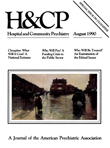Psychogeriatric Assessment and Treatment in Urban Public Housing
Abstract
A psychogeriatric outreach team provides in-home evaluation and treatment for elderly persons living in high-rise public housing in Baltimore. During the first ten months of the team's operation, housing staff referred 9.5 percent of the elderly residents of four public housing sites for evaluation. Evaluations were cornpleted for 85 residents, 25 percent of whom were age 80 or older. Twenty-one percent of the residents evaluated were unable to perform at least one basic activity of daily living such as eating, bathing, or dressing without assistance, and 54 percent needed help with cooking, cleaning, and other instrumental activities of daily living. Eighty-nine percent of the residents who were evaluated by the team met criteria for at least One DSM-III-R diagnosis; 63 percent of the disorders had not been previously diagnosed. The most prevalent diagnoses were dementia, depressive syndromes, schizophrenic and delusional disorders, and alcohol abuse or dependence.
Access content
To read the fulltext, please use one of the options below to sign in or purchase access.- Personal login
- Institutional Login
- Sign in via OpenAthens
- Register for access
-
Please login/register if you wish to pair your device and check access availability.
Not a subscriber?
PsychiatryOnline subscription options offer access to the DSM-5 library, books, journals, CME, and patient resources. This all-in-one virtual library provides psychiatrists and mental health professionals with key resources for diagnosis, treatment, research, and professional development.
Need more help? PsychiatryOnline Customer Service may be reached by emailing [email protected] or by calling 800-368-5777 (in the U.S.) or 703-907-7322 (outside the U.S.).



